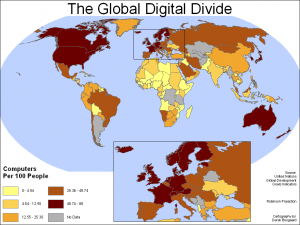My MIS Blog
Temple Techie
I have a blog called Temple Techie which is a collection of posts about Management Information Systems, Association for Information Systems, innovative technologies, and IT careers. To check out my MIS Blog click here!
Below is a selection of my favorite blog posts!
Mobile View: Computer View:


The Digital Divide

I am part of the “millennial” generation, like so many of my peers at the Fox School of Business, which means I was born at the cusp of the information technology explosion. I cannot remember my life without computers and smartphones, but shortly before I was born, these technological miracles did not exist. The workplace today consists of a myriad of diversity. When Fox students embark on careers in our respective fields, we will soon discover that there are going to be some individuals in the organization who are resistant to the adoption of technology. This will be their downfall. For decades, many organizations relied on filing papers and face-to-face communication. Today the world is a completely different place. Not to say that explicit verbal communication and intimate relationships with colleagues is not extremely important, but if a member of an organization does not embrace all the wonderful innovation that technology has to offer, they will be left largely in the dust. Recently, my MIS professor told me that in order to be relevant in the workforce you need to be tech-savvy. There are hundreds of accountants in an organization, he would say, what’s to say that you will survive a major company merger or acquisition? The answer is to be the tech-savvy accountant.
Many college students hear these words but do not fully grasp how powerful they really are; adopting microcomputer technology can mean the difference between launching an incredibly successful career and wallowing in the pitfalls of unemployment and student debt. The difference also outlines the spectrum of the digital divide. From this assumption, I posed the question, how much more money do technologically savvy business people make in organizations than those who are technologically impaired? The results are astounding.
So, when I speak to undergraduate students who are apprehensive about what major to choose, I urge them to consider these incredible statistics. According to the National Association of College and Employers, the top-paid business majors of the class of 2014 is Management Information Systems with an average starting salary of $62,100 followed closely behind by business management and finance at $55,600 and $55,400 respectively. When you embark on your professional endeavors within the Fox School of Business, think about the digital divide and what side you want to end up on, it is the difference between having a mediocre job and a satisfying career.
Leave comments or questions below about the MIS major and the importance of the digital divide to your professional success.
Security Concerns with Technology
Information technology offers an infinite number of benefits, from an individual and organizational standpoint, and has changed the way the world works in many regards. However, there is a danger associated with information accessibility at the tip of our fingers. That danger is privacy. Security concerns and surveillance from third parties are at an all-time high right now in the wake of current events. Given the recent security breaches of customer information at Target and Home Depot, there are security applications and risk compliance measures that companies are implementing to protect themselves from predators. Not only can organizations protect themselves from the threat of a security breach, but there are things that can be done on a personal level as well. Additionally, we are riddled with stories in the news about Snapchat and iCloud hackers that have leaked private celebrity photos.
As concerns for our personal privacy grow, a company called Silent Circle has been working on a solution to mitigate the crisis through their launch of a new and innovative product: the ultra-private smartphone. The hype about this new smartphone has to do with the encrypted voice calls and text messages if offers. The encryption from these ultra-private smartphones prevents eavesdroppers from listening into our calls, reading our messages, and accessing our data. The new phone will be called the Blackphone. The phone is built like an Android with a sleek design and compact size, so it is portable, but also equipped with software to protect us from hackers and data thieves. Its features include secure file transfer and storage, secure browsing and messaging, access to Blackphone security center, and compatibility with any phone carrier. I detest when my smartphone shares personal app activity to my social media accounts without my permission. I cringe when I hear that my mobile provider sells my information to other companies based on my interests and current spending habits. With this phone, all of these cringe-worthy moments are in the past! With the Blackphone, the user is the boss. We are in control of our data and the information that is provided to our apps and services. However, at prices starting at $629 it is doubtful that many Temple undergrads can afford one just yet. What do you think? Is privacy worth the price?
Do you have a privacy concern that you’d like to see addressed? Leave your comment below!
Is Location Really Everything?

At the Association for Information Systems meeting this week, a representative from Walmart came to speak to the group. Walmart is a supply chain leader and they are the pioneers for utilizing technology to innovate the supply chain process using Vendor Managed Inventory (VMI). In 1993, the firm was making $1 billion per week. This seems minuscule compared to their current rate: an astounding $1 billion every 36 hours.
This is not the first time I met with a Walmart representative on campus. I was honored to meet with Ben Hasan, the SVP & Chief Culture, Diversity and Inclusion Officer at Wal-Mart Stores, Inc. on two separate occasions. Every time I speak to a Walmart intern, employee, or executive I hear nothing but positive stories about their organization and culture. As undergraduate students, the ultimate goal is to find our dream job, a reputable organization where we are able to showcase our skills that we worked four years perfecting. Walmart seems like the ideal place to work. However, when I spoke to undergraduate students applying for their first jobs, an overwhelming amount of them stressed the importance of location. Why is location such an important factor to base job offers on?
Walmart is based out of Bentonville, Arkansas, two lefts from the middle of nowhere-ville. Many Temple grads are finding jobs locally, so they can stay in Philadelphia. Many of them have not even considered leaving the city. When I expressed my concern to Mr. Hasan he asked me, have you ever lived anywhere else besides Philadelphia? I was floored; I hadn’t ever expanded my horizons and left this little bubble. He went on to admit that when he was my age he never wanted to move far from Philadelphia because this is where he grew up as well. However, he said his move to Arkansas was the best career decision he has ever made. He is able to do things that he never dreamed possible and there is incredibly positive comradery among his coworkers. They even go sky diving and zip lining together! In addition, the cost of living is so low and the size of real estate compared to the cost is unparalleled.
So, next time that you turn down an internship or a job opportunity because of the location, think about all the amazing life experiences you would miss out on by not expanding your horizons. My advice: don’t turn down an incredible opportunity to be able to work for a Fortune 1 company because it isn’t close to home, maybe it’s time to make that your new home.
Have you relocated for a job? Leave a comment below!
The Risk is Worth the Reward
 This week at the AIS meeting, the CEO of RJMetrics came to speak to us about his career experiences. The thing I admire so much about people who start their own company is the courage it takes to be able to quit a corporate job. It is not secret that formulating a business plan, obtaining a customer base, and creating a brand takes intense passion and hard work to yield a financial return, let alone achieve success. Starting your own business is so risky because if it fails all of your life savings are sunk, and many people do not recover from that. The reason RJMetics is prospering is because of the hard decisions he made along the way. First, his college courses and poker software venture developed his coding skills. In addition, he persevered through much adversity. At one point, he started a lifestyle business that never made it off the ground. He realized from this failure that he needed something with a larger profit margin and audience, so he created the Business Intelligence Ecommerce Company, RJ Metrics.
This week at the AIS meeting, the CEO of RJMetrics came to speak to us about his career experiences. The thing I admire so much about people who start their own company is the courage it takes to be able to quit a corporate job. It is not secret that formulating a business plan, obtaining a customer base, and creating a brand takes intense passion and hard work to yield a financial return, let alone achieve success. Starting your own business is so risky because if it fails all of your life savings are sunk, and many people do not recover from that. The reason RJMetics is prospering is because of the hard decisions he made along the way. First, his college courses and poker software venture developed his coding skills. In addition, he persevered through much adversity. At one point, he started a lifestyle business that never made it off the ground. He realized from this failure that he needed something with a larger profit margin and audience, so he created the Business Intelligence Ecommerce Company, RJ Metrics.
Another important career move he made was to quit programming and start making the strategic business decisions for the company. Upon expanding his company, he found programmers that were better than him so he could take a backseat to the tactical work and start being a leader. These business moves is what made, and is still making, RJMetrics an incredibly successful company. Finally, something that resonated with me during his presentation is that he did not have a mission statement or a defined culture when he started the business. He gave his new employees the opportunity to craft the mission statement. That is what makes working at a start-up so rewarding: employees are vital in shaping the company culture, they are not handed a booklet listing the corporate value system – they create them.
What do you think about start-ups? Leave a comment below!

